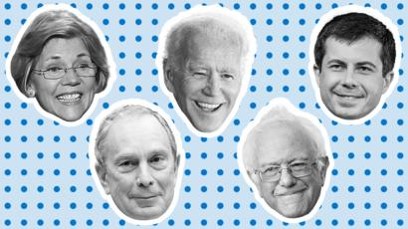The Road to the White House
The race for the Democratic representative to face Donald Trump in a general election this November has exposed the Party’s weaknesses and increased the possibility that the incumbent president will prevail.

The first caucus, was held in Iowa, deep in the Midwest farming belt of the US, of which 90% of the population is white, hardly representative of an increasingly less white country as a whole. It was a disaster. They couldn’t even count the votes correctly and couldn’t even declare a winner, though Bernie Sanders and Buttigieg seemed to have come out neck and neck.
Next was the New Hampshire primary, another 90% white enclave whose motto on its licence plates is “Live free or die,” was won by Sanders but with Buttigieg not far behind.
Buttigieg is the first openly gay person to compete for the presidency, Bernie Sanders who lost the nomination last time round to Hillary Clinton, is a so-called Democratic Socialist, thus considered radical within the US political spectrum. Neither of them is given much of a chance of beating Trump in the fall.
Much hope was vested in Elizabeth Warren, a senator from Massachusetts whose blueprint for how to guide the US economy was lauded for its thoroughness and practicality. Yet she has stumbled and failed to gain any kind of momentum, scoring poorly in the first two contests.
The race now moves to the south, where other factors come into play, mostly in terms of the much larger African American presence and their involvement in the process. Blacks make up the most loyal voting bloc for the Democratic Party (something like 93% of black women voted against Trump) and so their allegiance is coveted by the candidates.
Neither Sanders nor Buttigieg have made inroads into the black community. Former vice-president Joe Biden, once considered a favorite, fared badly in both Iowa and New Hampshire, and is flailing. He does, however, appear to have deep support among African Americans, indelibly associated as he is with Barak Obama’s presidency.
Looming above the race is the entrance of Michael Bloomberg, former mayor of New York and a multi-billionaire, who appeals to many moderates within the party but also, in some people’s minds, can gain traction with swing voters, who will ultimately decide the election. Bloomberg is pouring millions of his own money into the race. Since he is an outsider and once a Republican, he is distrusted by many in the Democratic Party establishment.
The results of South Carolina’s primary may clarify the jumbled mess that now constitutes the race, but there are still big divides within the Party between its liberal and moderate wings. The former argue that the focus on clawing back the working class white men who voted for Obama (often twice) but switched to Trump in the last election, is misplaced.
What is needed, they argue, is the consolidation of the various spheres within the party under new and bold government-sponsored programs. Many of Sanders’ and Buttigieg’s supporters are young and passionate, and without a motivated youth, Democrats have little hope of regaining the White House.
The moderates argue that Sanders’ is too far from the mainstream to have a chance against Trump, and Buttigieg’s sexual preference an impediment to his progress towards the ultimate prize. They might not say that out loud.
Swing voters, perhaps fed up with Trump’s general crassness rather than his policies (the economy is booming) are the key to the race. Trump is so polarizing that the great majority of the population have already made up their mind long ago and are unlikely to be swayed either way. It’s the 20% of people who could be coaxed to vote Democratic that will win the election, they would posit.
These same might add: beware of going too far to the left. Look what happened to the hapless Jeremy Corbyn in the UK, whose program that included the re-nationalization of some industries, and who was trounced by the Conservatives, who now hold an unassailable majority. It seems that left-wing ideas when an economy is doing well and most people have jobs are less attractive than in times of hardship.
To beat Trump, the Democrats must come up with a strong, inspiring candidate who can expose him for the fraud that he is, while maintaining some dignity and civility. This is a Herculean task, and one which none of the candidates seem capable of at the moment.